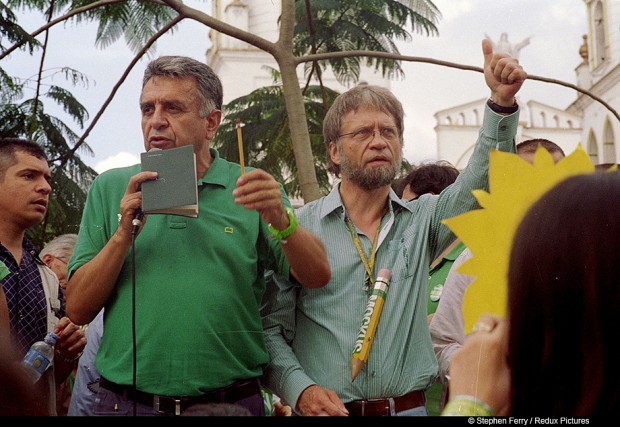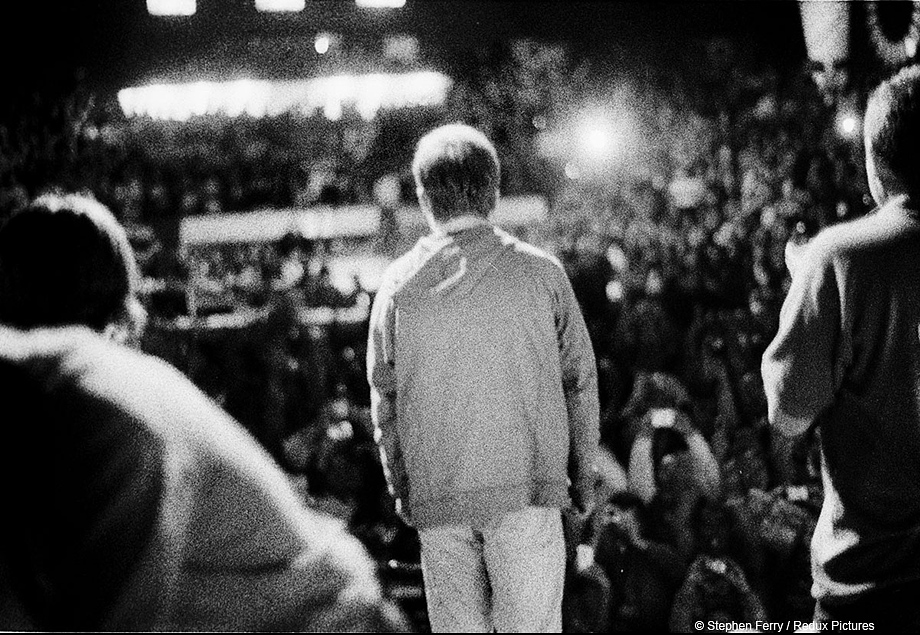Notes
Stephen Ferry: Election In Colombia
As part of an occasional series, Columbia Ongoing, Stephen Ferry reports on the Colombian Presidential Election:
Antanas Mockus: The Sunflower vs. the Status Quo
As candidate for president of Colombia, Antanas Mockus has made it to the second round of the election cycle. His supporters hid their disappointment that the eccentric former mathematics professor did not do better than 21% of the vote in the May 30 primaries, pointing to the fact that Mockus’s Green Party is only a year old and that the front-runner, Juan Manuel Santos, represents one of the richest families in the land and enjoys the support of the country’s enormous armed forces.
Despite the fact that Santos, who won 46% of the recent vote, will almost certainly win the June 20th run-off, Mockus’s relative success represents the kind of surprise that befits the land of Gabriel Garcia Marquez.
Of Lithuanian descent, the former mathematics professor and philosopher first gained national fame when, as rector of the National University, he shined a moon at an auditorium of heckling students. Later, as mayor of Bogota, Mockus gained international recognition for his highly unorthodox, yet effective, methods of governing the capital, at the time one of the most violent and corrupt cities in Latin America.
Mockus cultivated civic consciousness using an eccentric symbolic pedagogy, which included draping the city with enormous banners of carrots; Mockus once held a press conference on the city’s mortality rate at the morgue, surrounded by cadavers; he cut traffic fatalities in half by stenciling stars on the streets everywhere a pedestrian had been run over. Over his two terms as Mayor, the homicide rate in Bogota fell by 56%, making the capital an oasis of security in a violent land, and his administration was lauded for its honesty.
With the sunflower as his campaign symbol (in reference to his looks), and a pencil around his neck, Mockus’s image as a quirky, honest professor has proved refreshing for many war-weary Colombians. His combined ticket with the curly-haired former mayor of Medallion, Sergio Fajardo (himself a Ph.D. in mathematics) inspired “flash mob” rallies organized by youthful fans on Facebook.
So what happened to the lead Mockus enjoyed in the polls only two weeks ago?
A series of totally incomprehensible performances in recent debates, and his nerdy love of arcane statistics, certainly did not help his cause. Whether his rendition of “Happy Birthday” in Lithuanian on a popular talk show helped or hurt him is anyone’s guess. Analysts here argue that the outspoken animosity of Hugo Chavez towards Juan Manuel Santos probably ended up helping the former Defense Minister, by stirring up nationalist resentment at Venezuelan meddling in Colombia’s affairs. For Chàvez, who has accused Santos of sending squads of paramilitaries to Venezuela to assassinate him, Santos is the true meddler.
Fundamentally, Colombia is a country that is still at war, where toughness against FARC guerrillas may be valued more than honesty and creative governance. Hardline president Alvaro Uribe, and his draconian policies of “Democratic Security,” remain popular among the majority of Colombians, despite scandals linking him to vicious right-wing militias. Uribe favors Santos, which seems enough to guarantee him victory, despite a grotesque scandal which broke during Santos’s term as Defense Minister, during which the Colombian military was exposed for the systematic practice of murdering young Colombian men, dressing them as guerrillas, and claiming them as battlefield victories. Think General Westmoreland in the Vietnam War, but using your own civilians to pad the body count.
For many worried Mockus supporters, a Santos victory means only one thing: More violence.
–Stephen Ferry
PHOTOGRAPHS by STEPHEN FERRY / REDUX PICTURES
captions– Top: GIRON/SANTANDER, COLOMBIA: May 6, 2010. Lucho Garzon (L), and Antanas Mockus (R) presidential candidate of the Partido Verde (Green Party), gesture during an electoral campaign rally. Colombia held the first round of its presidential elections on May 30th.
Bottom: Antanas Mockus at campaign rally at El Theatron club in Bogota, May 8, 2010.




Reactions
Comments Powered by Disqus